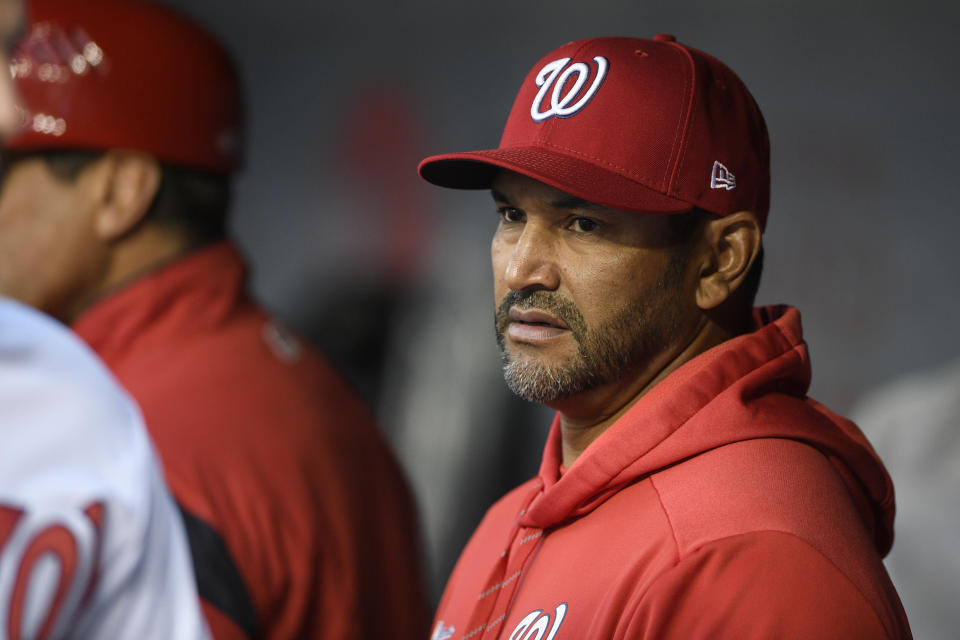The Nationals are one of the worst teams in baseball, and there's plenty of blame to go around
The Washington Nationals sent a clear message when they fired Dusty Baker a season and a half ago: Simply making the playoffs was no longer good enough. The team had to do better.
After failing to make the playoffs in 2018, things don’t look promising for the Nationals this season either. The team suffered its fourth-straight loss Wednesday, dropping a 7-3 game against the Milwaukee Brewers. With the loss, the Nationals now sit at 14-22 on the season.
That record gives the Nationals the second-fewest wins in the National League. It also gives the team one more win than both the Baltimore Orioles and Kansas City Royals, two clubs clearly in rebuild mode.
Where did it all go wrong?
With the Nationals, there’s plenty of blame to go around. Some may be more responsible than others, but removing one person from the equation isn’t going to magically fix the team’s issues.
At the center of the Nationals’ struggles is manager Davey Martinez. The 54-year-old Martinez hasn’t lived up to the lofty expectations placed on him when he was hired.
After inheriting roughly the same roster that won 97 games in 2017, Martinez won just 82 games in 2018. He faced criticism for his in-game strategy and his focus on team building over fundamentals during spring training. Martinez vowed to alter his spring approach in 2019.
While there were fewer camels at spring training in 2019, the other issues remain. Martinez’s in-game decisions, particularly his bullpen management, has once again been an issue. He’s responded to those late-inning struggles by placing the blame on his pitchers.
Doolittle on Renfroe's homer on a changeup away that he was out in front of: "Shocked."
Martinez on the pitch selection: "I didn't understand that. His fastball was really crisp today. He was throwing 96. For me, it's about keeping things simple."— Mark Zuckerman (@MarkZuckerman) April 27, 2019
People have been quick to point out injuries have played a role in the team’s slow start in 2019, but Baker dealt with similar issues — as well as a thin bullpen — and still made the playoffs in both seasons as the team’s manager.
Baker may still be managing the Nationals today if not for the team’s owners. The Lerner family has routinely refused to spend money on managers. That approach may have been the reason the team hired Matt Williams prior to the 2014 season.
Once Williams was out, the Nationals attempted to lure Bud Black to the club. They reportedly only offered him a one-year deal. When Black said no, the Nationals turned to Baker. They signed him to a two-year deal that paid Baker half as much as he made with the Cincinnati Reds.
Instead of going after a high-profile manager like Joe Girardi after Baker was let go, the team again went cheap and brought in Martinez.

The Lerner family has done one thing well in recent years, however. They’ve signed big-name free agents to supplement their young core. Under their watch, Max Scherzer, Patrick Corbin and Daniel Murphy have inked significant deals. They managed to extend Stephen Strasburg as well.
But one thing is consistent with all those deals: They all include deferred money. Every single premier signing by the Nationals — and even minor ones like Joe Blanton and Matt Wieters — are all on the Bobby Bonilla plan. They’ll be paid long after their time with the Nationals is over.
While the Nationals have had success with that strategy, delaying money could turn off significant free agents who are looking for standard deals. Deferred money is not the only reason Bryce Harper chose to leave the team to sign with the Philadelphia Phillies, but the fact that Harper’s deal wouldn’t be fully paid to him until 2072 made the Nationals’ offer less appealing. Other free agents could feel the same way.
Despite the Lerners’ willingness to make big additions, their insistence to remain under the luxury tax in 2019 prevented the team from adding useful bullpen pieces they desperately need now.
General manager Mike Rizzo comes out of this situation looking the best, but mostly because he can point to the luxury tax directive as a reason he hasn’t been able to make key upgrades.
By all accounts, Rizzo has been an effective general manager. His trades have worked out exceptionally well, and few of the team’s big-ticket signings have flopped.
But even he has to take some blame here. Rizzo’s knee-jerk trade of Brandon Kintzler and release of Shawn Kelley last season may have been about sending messages, but those decisions cost the Nats two good relievers the team couldn’t afford to lose.
Rizzo also fought hard for the team to hire Matt Williams and Martinez. Both look like awful decisions unless Martinez can find a way to turn things around.
If that doesn’t happen, the Nationals could be in for major changes before the offseason. Martinez is already a strong candidate to be let go, according to oddsmakers, and Rizzo could follow if the new manager can’t produce a playoff spot.
Cleaning house might be necessary, but it won’t fully fix the problem. The path to a championship doesn’t exist if the Nationals are going to operate with the same approach to managers and payroll.
That will put the team in the exact same situation, only with a couple different names.
———
Chris Cwik is a writer for Yahoo Sports. Have a tip? Email him at christophercwik@yahoo.com or follow him on Twitter! Follow @Chris_Cwik
More from Yahoo Sports:

